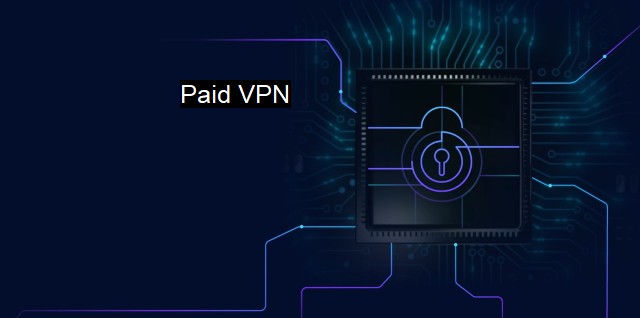What is Paid VPN?
Ensuring Online Security with a Paid VPN: A Comprehensive Guide to Protecting Your Internet Privacy and Accessing Restricted Content
Virtual Private Network (VPN) services have increasingly become a fundamental tool for internet users worldwide. Among the two types of VPN services, mostly used are the Paid VPNs and Free VPNs. This piece concentrates on Paid VPNs, their functions, benefits, and importance in the context of cybersecurity and antivirus.A Paid VPN is a service that adds a security layer between a user's network and the internet. Users subscribe to this level of service by paying a specific price to use these secure virtual connections to the internet. This extra security layer encrypts the internet user's data and activities while also changing their IP address. By doing so, Paid VPNs ensure user data is undecipherable to interceptors, and any attempts to trace back the origin of the internet data get misled.
When moving data across the internet under this cloak of security, users primarily observe enhanced privacy, security, and anonymity as primary improvements. Other additional benefits of a Paid VPN stem from them not being reliant on profits from unsolicited adverts or selling collected user data. This factor inherently enables Paid VPNs to provide a more secure, faster, and less disruptive experience based on the absence of bandwidth restrictions and experienced-based service levels.
Placed a Paid VPN becomes an invaluable resource. Network breaches and data thefts usually occur due to unencrypted data transmissions and unsecure network connections. As a form of security software that addresses these common gaps, a Paid VPN encrypts all internet data being received or sent, reducing threats imposed by cybercriminals, hackers, or malicious software.
Paid VPNs work hand-in-hand with antivirus software as part of the cybersecurity combo. While the antivirus solution protects the user's device from being infected by viruses and other malware, the VPN solution further strengthens the layers of security via the internet. Another notable partnership is evident in situations where the antivirus solution locates and quarrels a Trojan, Spyware, or any malicious spamware, for example. Conversely, the VPN maintains a low profile by hiding and securing any data these malicious programs might be targeting.
Paid VPNs are commonly known for offering better servers, as they have a multitude of options that free ones do not usually offer. This characteristic directly improves the VPN connection speed, reduces buffering, and primarily comes in handy when avoiding throttling from Internet Service Providers. They also provide better tech support, server distribution globally, accountability, and consumer trust due to being funded by subscribers, unlike free VPNs that usually rely on advertising revenues and often fail to provide customer support.
In the world of business, Paid VPNs are a highly recommended tool, as they enable remote work securely and privately. The multi-layered encryption ensures that sensitive company data transmitted over the network is safe from malicious attacks, thereby ensuring business continuity even amidst potential threats.
While a Paid VPN is not a cure-all for all cybersecurity threats, it does play a significant role in making the internet safer for users and businesses alike. Pairing an excellent antivirus solution with the security layers, privacy insurance, and globally expedient server access a Paid VPN offers, internet users find themselves securing demonstratively protective cybersecurity safeguards. the decision to opt for a Paid VPN is merely a strategic move towards bolstering global network and communication security – a necessity in this internet-driven age.

Paid VPN FAQs
What is a paid VPN and how does it work?
A paid VPN is a virtual private network service that requires a subscription fee to use. It works by encrypting your internet traffic and routing it through a server located in a different location than your actual location. This allows you to browse the web anonymously and securely, protecting your online privacy and preventing cyber threats.What are the benefits of using a paid VPN service?
Using a paid VPN service offers several benefits, such as enhanced online privacy and security, access to geo-restricted content, and protection against cyber threats like malware, phishing, and hacking. It can also provide anonymity on the internet, preventing your online activities from being tracked by third parties.Are paid VPNs better than free VPNs in terms of cybersecurity and antivirus protection?
Yes, paid VPNs are generally better than free VPNs when it comes to cybersecurity and antivirus protection. Free VPNs often have limitations in terms of the number of servers, bandwidth, and security features they offer. Paid VPNs, on the other hand, offer better security features, more server locations, and faster performance, making them more effective for protecting against cyber threats.What factors should I consider when choosing a paid VPN service?
When choosing a paid VPN service, you should consider several factors, such as server locations, security protocols, encryption standards, logging policies, and customer support. You should look for a VPN service that offers servers in different locations, supports multiple security protocols such as OpenVPN and IKEv2, uses strong encryption standards like AES 256-bit, has a strict no-logs policy, and provides prompt and knowledgeable customer support.| | A | | | B | | | C | | | D | | | E | | | F | | | G | | | H | | | I | | | J | | | K | | | L | | | M | |
| | N | | | O | | | P | | | Q | | | R | | | S | | | T | | | U | | | V | | | W | | | X | | | Y | | | Z | |
| | 1 | | | 2 | | | 3 | | | 4 | | | 7 | | | 8 | | |||||||